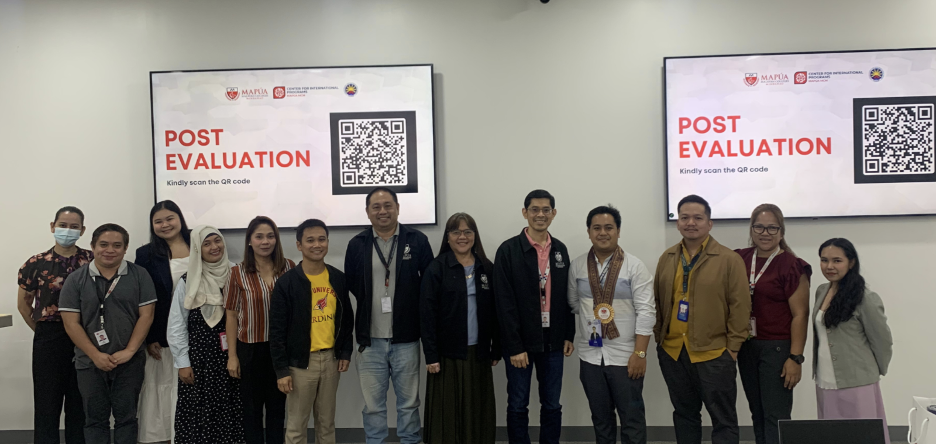On May 9, 2025, Mapúa Malayan Colleges Mindanao (Mapúa MCM) took a proactive step in strengthening its global engagement initiatives by hosting the orientation titled “Unlocking Global Potential and Synergies: CHED Orientation on Internationalization and Transnational Higher Education.” The event, conducted both on-site at the Mapúa MCM Global Classroom and online via Zoom, was made possible through Mapúa MCM’s initiative to invite the Commission on Higher Education (CHED) Region XI. The orientation aimed to deepen the institution’s understanding of the key principles and practices of internationalization and Transnational Higher Education, ensuring that Mapúa MCM remains aligned with national policies and globally recognized educational standards.
Transnational Higher Education (TNHE) includes all types and modes of delivery of higher education study programs, sets of courses of study, or educational services—including distance education and study-abroad programs—that involve education systems of a State different from the State where a TNHE provider operates. It may also refer to programs which function independently of any national education system or where the learners are located in a country different from the one where the awarding institution is based. This flexible and border-crossing model of education plays a pivotal role in expanding global academic access and collaboration.
As part of national and institutional efforts to prioritize relevance and impact in international education, CHED has identified several Priority Areas for TNHE. These include: Transportation Studies, Climate Change, Design Engineering, Education (Professional Education and Training, Educational Neuroscience, Educational Planning, Economics and International Development, Lifelong Learning), Tropical Medicine/Public Health, Energy Security/Renewable Energy, Social Science, Oceanography, Economics, Agriculture/Food Security, Digital Innovation and Creativity, AI/Cybersecurity/Data Science, Game Development/Software Development, Adult Education, Naval Architecture, Maritime Affairs and Diplomacy, Creative Industries, Care Industry, Logistics and Manufacturing, and Energy.
A major highlight of the session was the discussion on outbound student mobility, anchored on two pillars of internationalization: home-based internationalization and cross-border internationalization. Home-based internationalization focuses on fostering global engagement through partnerships, collaboration, networking, and academic linkages with foreign higher education institutions (HEIs) without requiring physical travel. In contrast, cross-border internationalization involves the actual movement of students, faculty, programs, and knowledge across national boundaries. Addressing practical concerns such as the cost of studying abroad, CHED’s representative, Sir Jay-ar Ahron, emphasized that “home-based internationalization is an alternative to cross-border internationalization; in order to successfully conduct home based internationalization, you can have it on your curriculum and programs.”
This orientation aligns with Sustainable Development Goal (SDG) 4 – Quality Education, which promotes inclusive and equitable access to quality education and lifelong learning opportunities. By equipping HEIs with strategies for both home-based and cross-border internationalization, CHED empowers institutions to deliver globally competitive education while remaining accessible to a wider range of learners.
Moreover, the event supports SDG 17 – Partnerships for the Goals, as it emphasized the importance of building strategic global linkages, networks, and collaborations. These partnerships serve as vital conduits for knowledge exchange, innovation, and mutual capacity-building among higher education institutions worldwide.
The said event forms part of Mapúa MCM’s long-term goal to broaden academic horizons, improve global competence, and prepare its students for international opportunities. By closely aligning with the CHED Memorandum Order No. 55, Series of 2016—Policy Framework and Strategies for the Internationalization of Philippine Higher Education—the institution ensures that its academic programs, operational processes, and international efforts meet both local regulatory standards and global benchmarks. With CHED’s support and guidance, Mapúa MCM reaffirms its commitment to becoming a leading academic institution not just in the region, but within the broader global higher education landscape.


